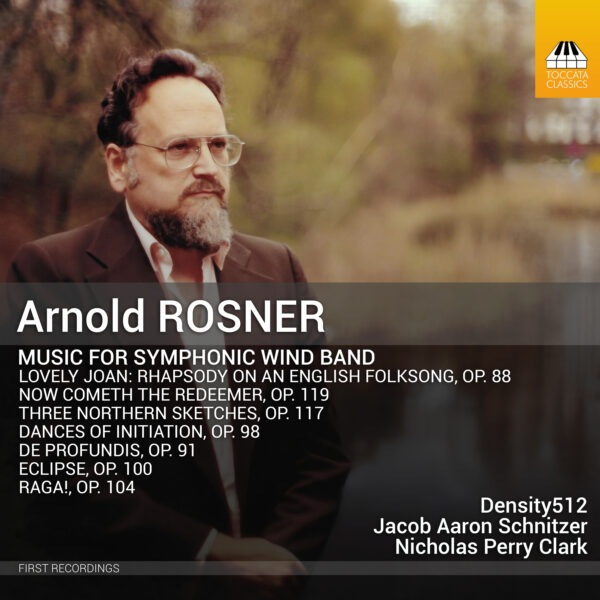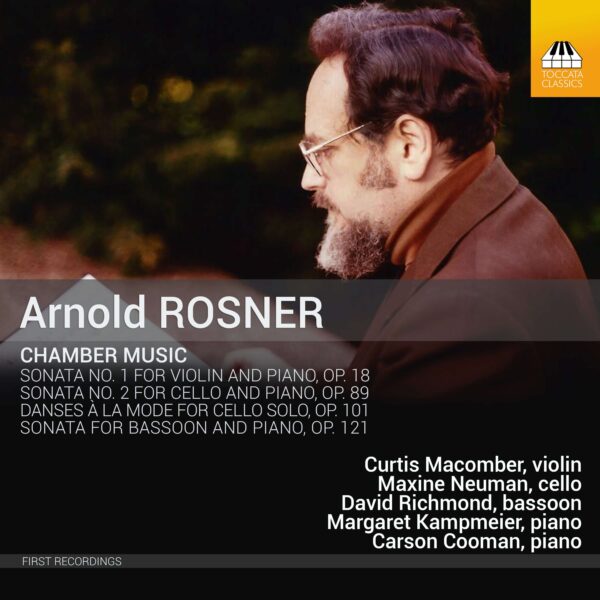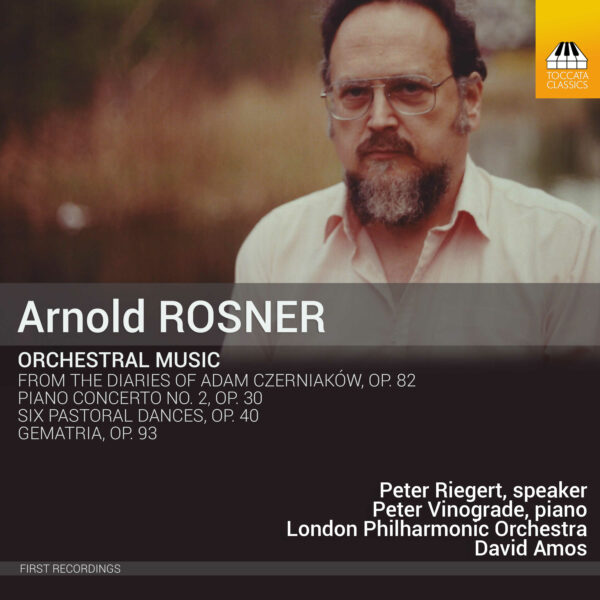Arnold Rosner: Music for Symphonic Wind Band
Arnold Rosner (1945–2013) was a New Yorker through and through, but his musical language reached across time and culture, clothing the modal harmony and rhythm of pre-Baroque polyphony in rich Romantic colours, thus producing a style that is instantly recognisable and immediately appealing. Having written his Eighth Symphony for symphonic wind band, he took a liking to the medium, composing seven more works for this popular feature of American university life, none of them recorded before now. Their inspiration is eclectic – from ethnic material and natural phenomena to religious stimuli – but Rosner’s unerring balance of dignity and energy is common to all of them and stamps them with a sound that is uniquely his.
Density512
Jacob Aaron Schnitzer, conductor
Nicholas Perry Clark, conductor
Listen To This Recording:
Dances of Initiation, Op. 98 (1993) (8:18)
- I. Maestoso (2:06)
- II. Andante moderato (3:06)
- III. Allegro (2:56)
- Eclipse, Op. 100 (1994) (12:27)
- RAGA!, Op. 104 (1995) (10:45)
- De Profundis, Op. 91 (1991) (10:11)
- Now Cometh the Redeemer, Op. 119 (2005) (10:01)
Three Northern Sketches, Op. 117 (2003) (13:16)
- No. 1, Ice Sculpture (3:50)
- No. 2, Pastorale (3:14)
- No. 3, Aurora (6:12)
- Lovely Joan: Rhapsody on an English Folksong, Op. 88 (1990) (8:39)
First Recordings



Gramophone :
‘Having been mightily impressed by previous Rosner albums from Toccata Classics, I approached this newcomer of wind band works with high expectation. I was not disappointed. […] this fine, varied programme should entice the ear. […]
Now Cometh is the masterpiece of nobility of spirit. […] De profundis [is] a compositional tour de force. […]
Recorded in the Bates Concert Hall in Austin, Texas, the sound Andrew DiRemiggio-Stoltz is first-rate. Well worth investigating.’
—Guy Rickards, Gramophone
Charlottesville Classical :
‘What surprised me is that this release features works for symphonic wind band. Without strings, Rosner’s music has an immediacy to it, bristling with raw power.
Rosner’s masterful orchestrations are idiomatic to the ensemble. None of this business of just substituting clarinets for strings! That gives Rosner’s wind band music a distinctive sound. […]
All these works are world premiere recordings. I hope we’ll start seeing them show up on concert programs. Every piece is a gem. […]
Density512 is a first-rate ensemble, dedicated to contemporary music. They play with commitment, expression, and enthusiasm. Arnold Rosner was truly a unique composer with a voice all his own. And it’s a voice that is accessible to modern audiences. If you’d not heard Rosner before, this is the album to start with. This is Rosner unfiltered.’
—Ralph Graves, Charlottesville Classical
Fanfare :
‘Arnold Rosner (1945–2013) was an American composer with a distinctive voice. The more you get to know his music, the quicker you recognize his style when you encounter a new piece. […] In all of his work I have consistently found deep feeling and nobility, along with the skill to unify various influences into a cohesive whole. […]
Rosner’s skill at manipulating instrumental color is front and center [the Eclipse], with atmospheric night music opening and closing the piece, surrounding the intense experience of the eclipse itself. […]
To my ears, [in RAGA! ] he has successfully embraced two musical cultures and merged them into a persuasive whole. Rosner’s comfort with modality makes his looking to Indian music particularly logical. […]
[De Profundis] is a somber work of great dignity and power. […]
Density 512 is an Austin-based chamber ensemble specializing in new music. They invited former members to join in to form the superb wind band heard here. Jacob Aaron Schnitzer and Nicholas Perry Clark are both affiliated with the group and share the conducting duties here. Toccata’s recorded sound is clear and well balanced. The label has long been an important champion of Rosner’s music, for which every lover of his music is grateful.’
—Henry Fogel, Fanfare
American Record Guide :
‘Terrific pieces, all given fine readings by the Austin-based “chamber orchestra and new music collective” Density512.’
—Barry Kilpatrick, American Record Guide
Fanfare :
‘I have written numerous times in these pages in praise of Arnold Rosner’s music, and I’m about to do so again; so in order to spice things up a little, I’ll start this review by praising Density512, the Austin, Texas-based chamber orchestra whose members and collaborators perform the music on this recording so expertly. […]
For this recording […] is a series of performances that are flawless in ensemble, rhythmically crisp and precise, vibrant in tone color, and perfectly balanced among the various instruments both in passages of dense counterpoint and in moments of exposed delicacy. This is top-caliber music-making, helmed by two conductors who clearly have an affinity for Rosner’s musical language and for his emotional palette. […]
The repertoire on this recording […] would be an excellent introduction for a listener not yet acquainted with Rosner. […]
Every piece on the album is an attractive and wholly representative example of Rosner’s aesthetic and emotional concerns. With such colorful, committed performances, and such a clean, vibrant recorded sound, the album is an essential entry in the recorded catalogue of Rosner’s works.’
—Myron Silberstein, Fanfare
Fanfare :
‘Even though I already owned all these works on a privately issued CD, I am very happy to upgrade it with this disc, as it is vastly superior in every parameter (recorded sound, performances, annotation, and overall presentation). Conductors Jacob Aaron Schnitzer and Nichlas Perry Clark and the Density512 chamber orchestra do a splendid job of bringing this wonderful music to life, and the program notes by former Fanfare reviewer Walter Simmons are erudite and comprehensive. A stratospheric recommendation all around.’
—David DeBoor Canfield, Fanfare